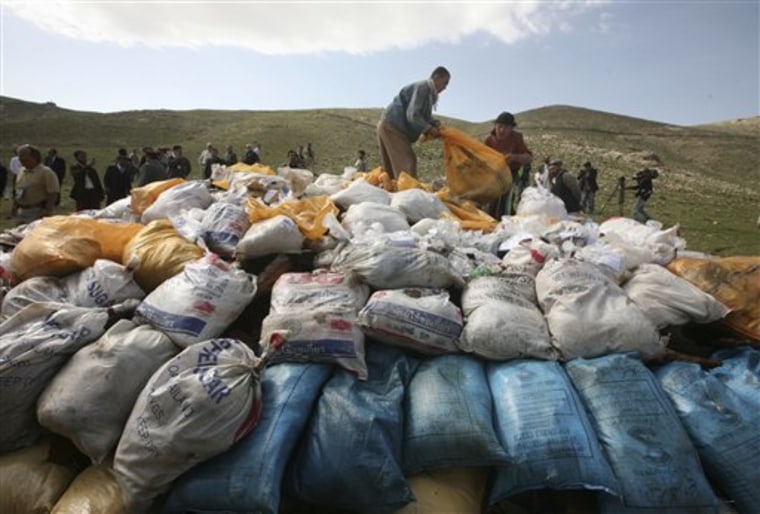A roadside bombing in Afghanistan killed two members of a new U.S.-funded civil defense force Sunday, while authorities destroyed 6.5 tons of drugs and chemicals seized in the battle against the rampant narcotics trade.
The two guards from the Afghan Public Protection Force were the first members of the new program to die in the line of duty, said Shahidullah Shahid, the spokesman for Wardak province's governor. Three vehicles were patrolling in Nirkh district of Wardak when the explosion ripped through one truck, he said.
The program trains and equips villagers to provide security in their own areas. Adm. Mike Mullen, chairman of the U.S. Joint Chiefs of Staff, visited Wardak last week to inspect the program and said early reviews were positive.
Gen. David McKiernan, the top U.S. and NATO commander in Afghanistan, said this month that if the Wardak program is successful, the defense initiative will be expanded to other parts of the country.
Drugs burned outside Kabul
Meanwhile, drugs confiscated by authorities over the last three to four months were burned Sunday in a large pile on a sloping mountainside on the outskirts of Kabul, said Gen. Khodaidad, the country's counternarcotics minister.
"This is a big success against terrorism, against people who are producing poppies," said Khodaidad, who like many Afghans goes by one name. "Poppy mainly supports the insurgency in Afghanistan."
Underscoring the dangers of the drug fight, another roadside bomb Sunday killed five counternarcotics police and two civilians while the police were surveying poppy fields in Kandahar province, the Interior Ministry said in a statement.
"This incident shows the enemies of Afghanistan work together with the smugglers of the country, and they are trying to prevent the fight against poppy cultivation," the ministry said.
The Taliban and other warlords may have earned almost a half billion dollars from Afghanistan's 2008 opium trade, the head of the U.N.'s Office on Drugs and Crime has said. Afghan officials have also been implicated in the trade.
Khodaidad acknowledged that the 6.5 tons of drugs — including heroin, opium, hashish and chemicals used to turn opium into heroin — represented only a symbolic drop in the bucket. A U.N. report last year said Afghan farmers produced 7,700 tons (7,000 metric tons) of opium in 2008 with an export value estimated at $3.4 billion.
Looking to increase poppy-free provinces
Gen. Dawood Dawood, the top counternarcotics officer in the Interior Ministry, said officials hoped to increase the number of poppy-free provinces from 18 last year to 26 this year. Khodaidad, perhaps providing a more realistic assessment, said he hoped the number increased to 22 or 23 this year.
Dawood said Sunday's drug burn was a "big achievement" for the country's counternarcotics police.
"By burning this amount of opium and narcotics we show the people we are committed to the fight against drugs," he said.
Elsewhere, police on Sunday said a roadside bomb in the eastern province of Khost on Saturday killed three border police. Three police were also wounded in the attack.
Afghan police, who have less training and equipment than the Afghan army, have borne the brunt of Taliban attacks in recent years. Close to 1,000 Afghan police were killed in militant attacks last year — more than 1 percent of the country's 82,000-member force.
